Identification of genetic elements in metabolism by high-throughput mouse phenotyping
- PMID: 29348434
- PMCID: PMC5773596
- DOI: 10.1038/s41467-017-01995-2
Identification of genetic elements in metabolism by high-throughput mouse phenotyping
Abstract
Metabolic diseases are a worldwide problem but the underlying genetic factors and their relevance to metabolic disease remain incompletely understood. Genome-wide research is needed to characterize so-far unannotated mammalian metabolic genes. Here, we generate and analyze metabolic phenotypic data of 2016 knockout mouse strains under the aegis of the International Mouse Phenotyping Consortium (IMPC) and find 974 gene knockouts with strong metabolic phenotypes. 429 of those had no previous link to metabolism and 51 genes remain functionally completely unannotated. We compared human orthologues of these uncharacterized genes in five GWAS consortia and indeed 23 candidate genes are associated with metabolic disease. We further identify common regulatory elements in promoters of candidate genes. As each regulatory element is composed of several transcription factor binding sites, our data reveal an extensive metabolic phenotype-associated network of co-regulated genes. Our systematic mouse phenotype analysis thus paves the way for full functional annotation of the genome.
Conflict of interest statement
The authors declare no competing financial interests.
Figures
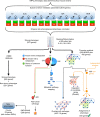
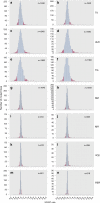
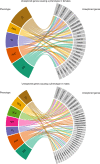
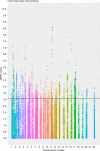

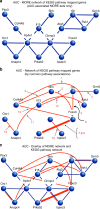

References
-
- Boehme MW, et al. Prevalence, incidence and concomitant co-morbidities of type 2 diabetes mellitus in South Western Germany–a retrospective cohort and case control study in claims data of a large statutory health insurance. BMC Public Health. 2015;15:855. doi: 10.1186/s12889-015-2188-1. - DOI - PMC - PubMed
Publication types
MeSH terms
Substances
Grants and funding
- U24 DK092993/DK/NIDDK NIH HHS/United States
- UM1 OD023221/OD/NIH HHS/United States
- R24 OD011883/OD/NIH HHS/United States
- U42 OD012210/OD/NIH HHS/United States
- MC_U142684172/MRC_/Medical Research Council/United Kingdom
- UM1 HG006370/HG/NHGRI NIH HHS/United States
- U54 HG006348/HG/NHGRI NIH HHS/United States
- MR/N012119/1/MRC_/Medical Research Council/United Kingdom
- K08 EY027463/EY/NEI NIH HHS/United States
- U42 RR024244/RR/NCRR NIH HHS/United States
- U42 RR033193/RR/NCRR NIH HHS/United States
- UM1 OD023222/OD/NIH HHS/United States
- U54 HG006332/HG/NHGRI NIH HHS/United States
- G0300212/MRC_/Medical Research Council/United Kingdom
- U54 HG006364/HG/NHGRI NIH HHS/United States
- UM1 HG006348/HG/NHGRI NIH HHS/United States
- U42 OD011174/OD/NIH HHS/United States
- U54 HG006370/HG/NHGRI NIH HHS/United States
- MC_QA137918/MRC_/Medical Research Council/United Kingdom
- U42 OD011175/OD/NIH HHS/United States
- WT_/Wellcome Trust/United Kingdom
- MC_UP_1502/3/MRC_/Medical Research Council/United Kingdom
- MC_U142684171/MRC_/Medical Research Council/United Kingdom
- U42 OD011185/OD/NIH HHS/United States
- U2C DK092993/DK/NIDDK NIH HHS/United States
LinkOut - more resources
Full Text Sources
Other Literature Sources
Medical
Molecular Biology Databases
Research Materials

